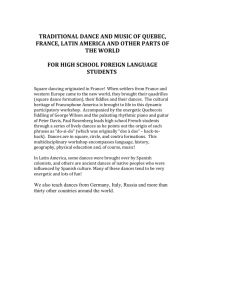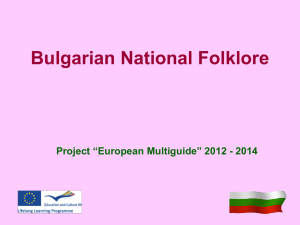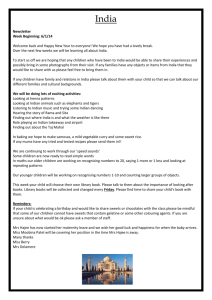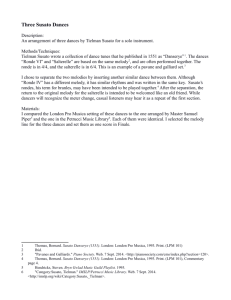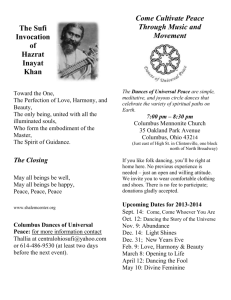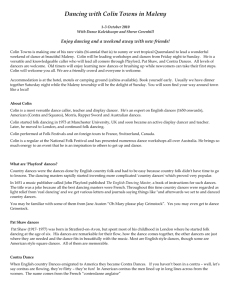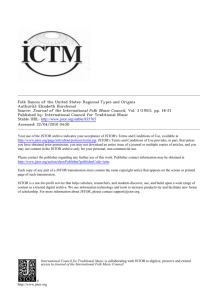Clues for the Diversity Scavenger Hunt
advertisement
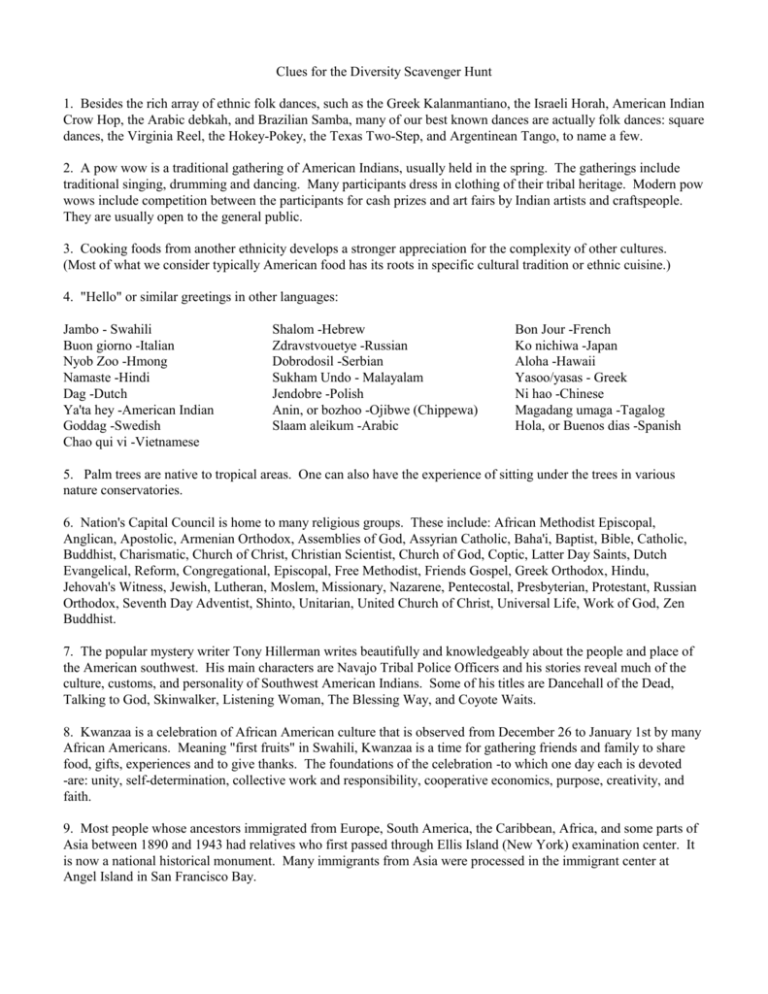
Clues for the Diversity Scavenger Hunt 1. Besides the rich array of ethnic folk dances, such as the Greek Kalanmantiano, the Israeli Horah, American Indian Crow Hop, the Arabic debkah, and Brazilian Samba, many of our best known dances are actually folk dances: square dances, the Virginia Reel, the Hokey-Pokey, the Texas Two-Step, and Argentinean Tango, to name a few. 2. A pow wow is a traditional gathering of American Indians, usually held in the spring. The gatherings include traditional singing, drumming and dancing. Many participants dress in clothing of their tribal heritage. Modern pow wows include competition between the participants for cash prizes and art fairs by Indian artists and craftspeople. They are usually open to the general public. 3. Cooking foods from another ethnicity develops a stronger appreciation for the complexity of other cultures. (Most of what we consider typically American food has its roots in specific cultural tradition or ethnic cuisine.) 4. "Hello" or similar greetings in other languages: Jambo - Swahili Buon giorno -Italian Nyob Zoo -Hmong Namaste -Hindi Dag -Dutch Ya'ta hey -American Indian Goddag -Swedish Chao qui vi -Vietnamese Shalom -Hebrew Zdravstvouetye -Russian Dobrodosil -Serbian Sukham Undo - Malayalam Jendobre -Polish Anin, or bozhoo -Ojibwe (Chippewa) Slaam aleikum -Arabic Bon Jour -French Ko nichiwa -Japan Aloha -Hawaii Yasoo/yasas - Greek Ni hao -Chinese Magadang umaga -Tagalog Hola, or Buenos dias -Spanish 5. Palm trees are native to tropical areas. One can also have the experience of sitting under the trees in various nature conservatories. 6. Nation's Capital Council is home to many religious groups. These include: African Methodist Episcopal, Anglican, Apostolic, Armenian Orthodox, Assemblies of God, Assyrian Catholic, Baha'i, Baptist, Bible, Catholic, Buddhist, Charismatic, Church of Christ, Christian Scientist, Church of God, Coptic, Latter Day Saints, Dutch Evangelical, Reform, Congregational, Episcopal, Free Methodist, Friends Gospel, Greek Orthodox, Hindu, Jehovah's Witness, Jewish, Lutheran, Moslem, Missionary, Nazarene, Pentecostal, Presbyterian, Protestant, Russian Orthodox, Seventh Day Adventist, Shinto, Unitarian, United Church of Christ, Universal Life, Work of God, Zen Buddhist. 7. The popular mystery writer Tony Hillerman writes beautifully and knowledgeably about the people and place of the American southwest. His main characters are Navajo Tribal Police Officers and his stories reveal much of the culture, customs, and personality of Southwest American Indians. Some of his titles are Dancehall of the Dead, Talking to God, Skinwalker, Listening Woman, The Blessing Way, and Coyote Waits. 8. Kwanzaa is a celebration of African American culture that is observed from December 26 to January 1st by many African Americans. Meaning "first fruits" in Swahili, Kwanzaa is a time for gathering friends and family to share food, gifts, experiences and to give thanks. The foundations of the celebration -to which one day each is devoted -are: unity, self-determination, collective work and responsibility, cooperative economics, purpose, creativity, and faith. 9. Most people whose ancestors immigrated from Europe, South America, the Caribbean, Africa, and some parts of Asia between 1890 and 1943 had relatives who first passed through Ellis Island (New York) examination center. It is now a national historical monument. Many immigrants from Asia were processed in the immigrant center at Angel Island in San Francisco Bay. 10. Learning to play a musical instrument is somewhat parallel to learning another language. In both, one studies and perfects qualities of sound, pitch, rhythm, timing and movement. 11. These kinds of experiences give us a small understanding of the challenges to mobility faced by people with permanent physical disabilities. 12. Breads from various cultures: Fry bread, corn bread -American Indian Corn Cakes, Skillet Bread -African American Dark Rye -Eastern European Tortilla -Mexico Steamed Rolls -Chinese Kulich -Russian Tsoureki -Greek Lavosh -Armenian Scones -Scottish Pumpernickel -German Chiapatti -Indian Pita -Middle Eastern Challah -Jewish Injera -Ethiopian 13. Paul Haggis’ Crash is a very honest, graphic and thought-provoking movie about contemporary race relations in a large American city. At times confrontational, the movie shows all sides of the issue with stark reality and without taking sides. It is an excellent vehicle for discussions about racism, prejudice, economic oppression, and the difficulties of living in a multicultural, though imperfect world. 14. Though an obvious advantage in a multicultural society, Americans have not traditionally supported or recognized the gifts of bilingual skills. Many adults have parents who are or were bilingual, but who have discouraged the children's use of the home language in preference to English. The current "English Only Movement" is destined to further reduce the maintenance of such valuable skills. 15. The principal ingredient of falafel is fava beans (sometimes chick peas). They are ground, mixed with spices, and deep-fried. It is a popular component of the cuisine of many Middle Eastern and North African peoples. 16. The most commonly known symbol in American Sign Language, the hand language of deaf people, is the sign for "I love you." It is signed by holding the hand upright, with index finger, little finger, and thumb extended. The middle two fingers are folded down. 17. Language is perhaps the most influential aspect of culture. To study a second language can provide key insights into another culture, as well as indirectly showing us aspects of our own culture we may not have recognized. 18. Having a significant friendship with a person from another culture, race, or religion can build understanding and appreciation of cultural differences if we recognize that our friend is an individual and not necessarily the same as everyone in that group. 19. Both books are novels by Chinese American women. The Woman Warrior, by Maxine Hong Kingston and The Joy Luck Club, by Amy Tan reveal the struggle first generation daughters often feel between contrasting values and role expectations of their traditional heritage and of American culture. 20. La Posadas is the traditional Mexican celebration at Christmas time that symbolizes Mary and Joseph's search for shelter. Beginning on December 16th and continuing through Christmas Eve, children undertake processions (often with candle lit luminaries and caroling) from house to house asking for shelter. At each home they are refused. The progression continues to the last home where they are welcomed. This home is the scene of a party that often includes the breaking of a piñata and folk dancing. -Tasha Lebow Reprinted and adapted with permission from Diversity Awareness, 1992, a publication of the Girl Scout Council of Metro Detroit.
